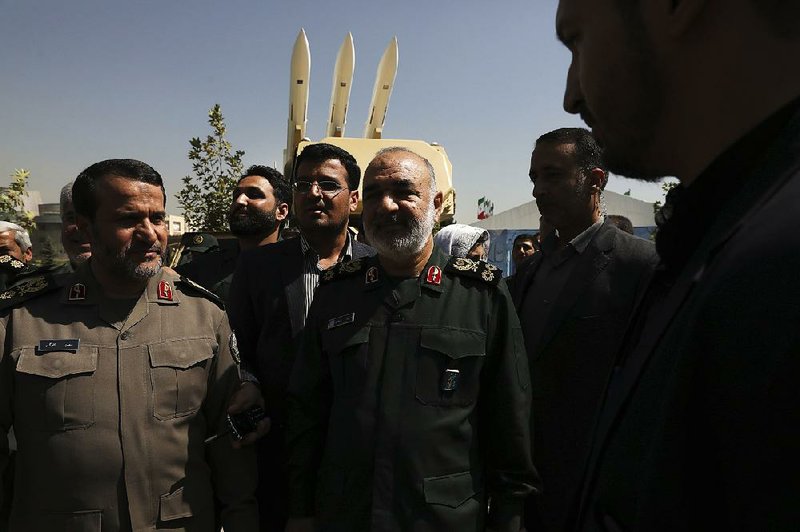TEHRAN, Iran -- Iran's Revolutionary Guard is ready for combat and "any scenario," its chief commander said Saturday, as the country's nuclear deal with world powers collapses and the U.S. alleges Iran was behind an attack on oil sites in Saudi Arabia that shook global energy markets.
Iran has denied involvement in the Sept. 14 attack that was claimed by Yemen's Iranian-backed Houthi rebels. Iranian Foreign Minister Mohammad Javad Zarif, who is in New York for United Nations meetings, has warned that any strike on Iran by the U.S. or Saudi Arabia will result in "an all-out war."
On Saturday, Gen. Hossein Salami, at a ceremony displaying pieces of an American drone that Iran shot down in June, said his forces have carried out "war exercises and are ready for any scenario."
He added: "If anyone crosses our borders, we will hit them."
Zarif claimed in a tweet that Saudi Arabia does not believe its own allegations that Iran was responsible for the attack on the oil sites.
"It is clear that even the Saudis themselves don't believe the fiction of Iranian involvement," Zarif said, pointing to what he described as a Saudi retaliatory attack on Houthi forces in southwestern Yemen.
Saudi Arabia has been at war with the Houthi rebels since March 2015. That conflict has killed tens of thousands of people. The U.N., Gulf Arab nations and the U.S. accuse Iran of supplying arms to the Houthis, which Tehran denies.
The Houthis announced Friday that they are halting all drone and ballistic missile attacks on Saudi Arabia -- a move welcomed Saturday by Martin Griffiths, the U.N.'s special envoy for Yemen.
If implemented in good faith, he said, a halt in hostile military acts against the Saudis "could send a powerful message of the will to end the war."
Griffiths said in a statement that he also welcomed the Houthis' "expression of further openness" to implementing a prisoner exchange agreement, "and the desire for a political solution to end the conflict."
He stressed "the importance of taking advantage of this opportunity and moving forward with all necessary steps to reduce violence, military escalation and unhelpful rhetoric."
Analysts say the missiles used in the Sept. 14 assault wouldn't have enough range to reach the eastern Saudi Arabia oil sites from Yemen. The missiles and drones used in the attack resembled Iranian-made weapons, although analysts say more study is needed to definitively link them to Iran.
Salami said Iran does not want to start a conflict, but he appeared to warn the U.S. and Saudi Arabia that Iran is prepared.
"We won't stop until the destruction of any aggressor. And we will not leave any secure spot," he said. "Do not miscalculate, and do not make a mistake."
In Riyadh, Saudi Arabia's minister of state for foreign affairs criticized Iran.
"The more engagement you have with Iran, the more Iran believes its aggressive behavior is acceptable in the world, and that is not acceptable, so those issues need to be considered," Adel al-Jubeir said at a news conference. He said the kingdom was waiting for the investigation's conclusion on where the strikes originated "so we can respond."
Meanwhile, oil-rich Kuwait continued to sound the alarm over the potential for tensions to spiral out of control.
The state-run Kuwait News Agency on Saturday quoted the CEO of Kuwait Flour Mills and Bakeries Co. as saying that it has foodstuffs available for upward of eight months if necessary. Mutleg al-Zayed said the company is ready to cope "with ramifications that may emerge as a result of conditions in the region," without elaborating.
Already, Kuwait has raised the readiness of its armed forces and increased security at its ports.
Elsewhere, according to Bloomberg News reports Saturday, Iran's semi-official Tasnim news agency said Iran will stage a naval drill with Russia and China in international waters.
"The joint drill will be held in the north of the Indian Ocean and the Sea of Oman," Tasnim said, citing Ghadir Nezami, head of international affairs and defense diplomacy at Iran's General Staff of the Armed Forces. "We have made no plan whatsoever to hold such a drill in the Persian Gulf."
The joint exercise will be the first by Iran, China and Russia in the Indian Ocean, according to the news agency.
The announcement came less than 24 hours after the U.S. said it would send a "moderate" number of American troops to the region and additional missile-defense capabilities to Saudi Arabia in response to the strikes on the oil facilities.
President Donald Trump signaled Friday that he was not inclined to authorize an immediate military strike on Iran in response to the attacks, saying he believes showing restraint "shows far more strength" and that he wants to avoid an all-out war.
Trump, who withdrew the U.S. from the nuclear deal more than a year ago, also said Friday that America "just sanctioned the Iranian national bank." He did not elaborate.
The U.S. Treasury Department said it took action against the Central Bank of Iran.
Iran's central bank chief, Abdolnasser Hemmati, sought to shrug off the new sanctions on Saturday. According to the state-run Islamic Republic News Agency, Hemmati said re-imposing sanctions on Iran's central bank shows the U.S. has little leverage left.
Information for this article was contributed by Amir Vahdat, Fay Abuelgasim, Jon Gambrell, Edith M. Lederer and staff members of The Associated Press; and by Arsalan Shahla of Bloomberg News.
A Section on 09/22/2019
